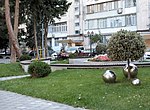Binagadi asphalt lake
Asphalt lakesCenozoic paleontological sites of AsiaGeography of BakuGeology of AzerbaijanPaleontology in Azerbaijan ... and 2 more
PleistoceneWorld Heritage Tentative List

The Binagadi asphalt lake (or Binagadi tar pits; Azerbaijani: Binəqədi gölü) are a cluster of tar pits in urban Baku, Azerbaijan. Asphaltum or tar has seeped up from the ground in this area for tens of thousands of years. The tar is often covered with dust, leaves, or water. Over many centuries, animals that were trapped in the tar were preserved as bones. This ancient flora and fauna deposit is protected by the State as a monument of a nature of the special significance pursuant to the Decree of the Government of Azerbaijan Republic No. 167 of March 16, 1982.
Excerpt from the Wikipedia article Binagadi asphalt lake (License: CC BY-SA 3.0, Authors, Images).Binagadi asphalt lake
Binagady Raion
Geographical coordinates (GPS) Address Nearby Places Show on map
Geographical coordinates (GPS)
| Latitude | Longitude |
|---|---|
| N 40.467777777778 ° | E 49.801111111111 ° |
Address
1053 Binagady Raion
Baku Ekonomic Zone, Azerbaijan
Open on Google Maps






